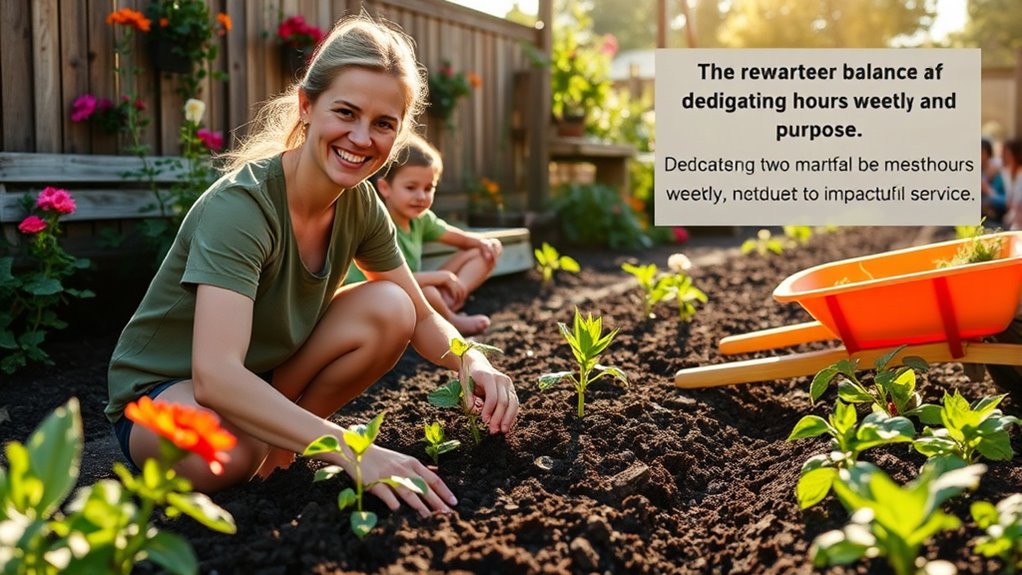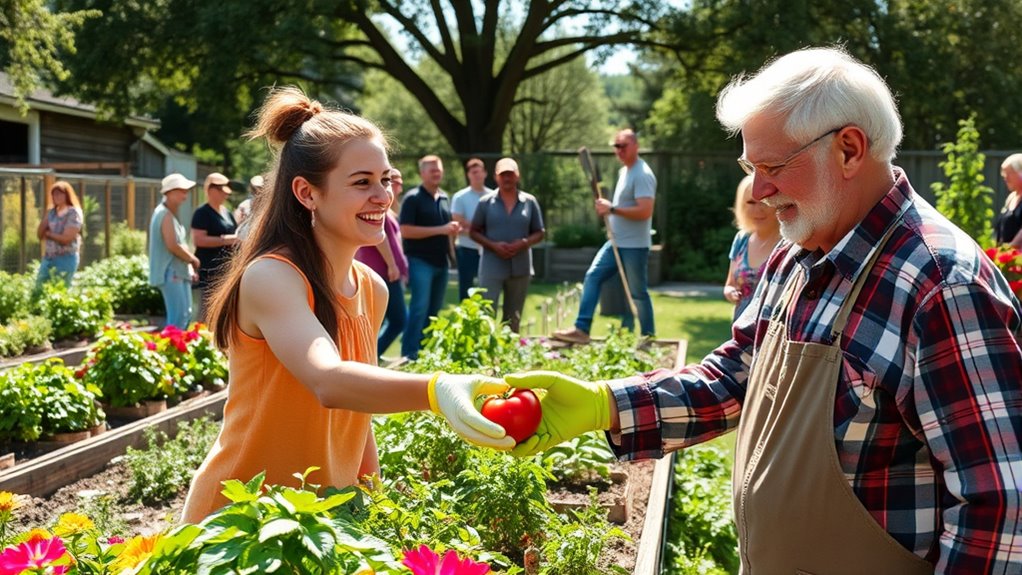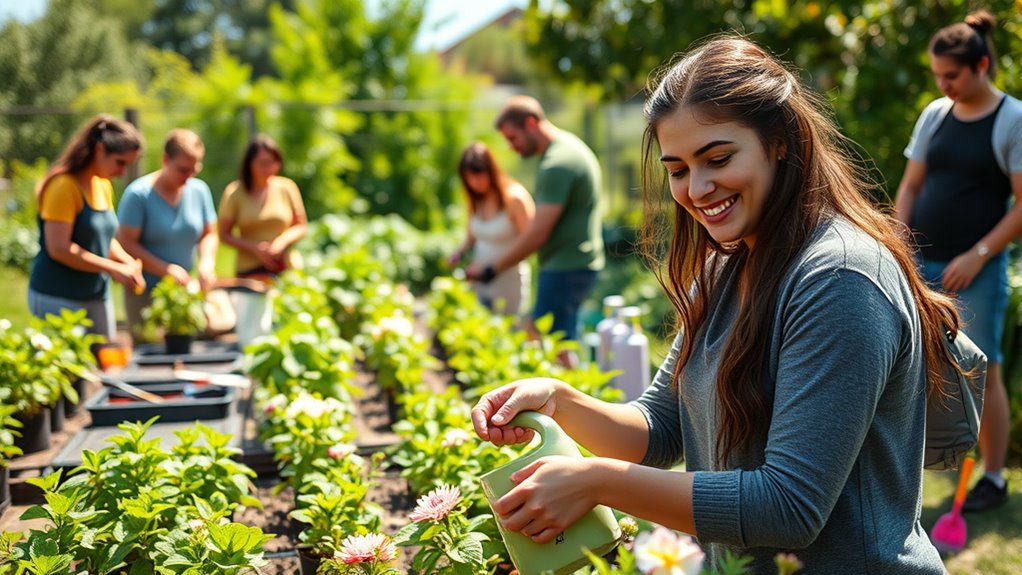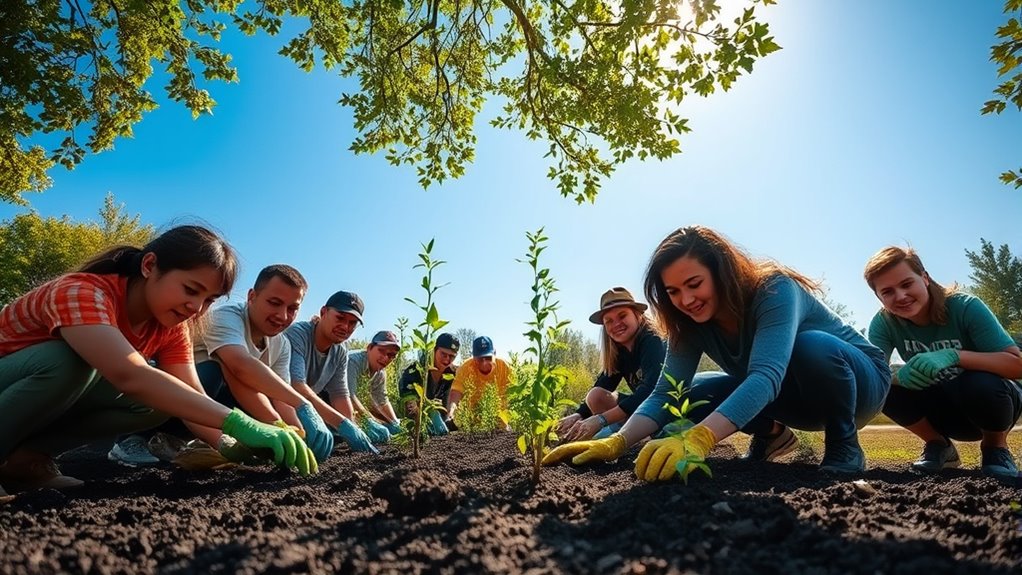Volunteering just two hours a week is a manageable commitment that can make a real difference in your community. It boosts your sense of purpose, helps you develop new skills, and fosters meaningful connections with others. Small efforts create ripple effects, strengthening bonds and building confidence. By focusing on achievable goals and staying consistent, you’ll find it sustainable and rewarding. Keep going, and you’ll discover how to maximize your impact in ways that fit your busy life.
Key Takeaways
- Even just 2 hours weekly can create meaningful community impact and foster genuine connections.
- Short, manageable volunteering sessions prevent burnout while boosting personal fulfillment and skill development.
- Consistent 2-hour commitments reinforce community bonds and increase long-term engagement.
- Focused, goal-oriented activities during this time maximize tangible benefits and measurable progress.
- Regular volunteering fosters support systems and camaraderie that sustain motivation and ongoing involvement.
Benefits of Committing Just a Few Hours

Even dedicating just two hours a week can make a meaningful difference, both for the community and for you. When you volunteer, your motivations often stem from a desire to give back, connect, or learn new skills. These motivations fuel your community engagement, turning small efforts into impactful actions. Committing a few hours keeps volunteering manageable and sustainable, avoiding burnout. You’ll notice that even limited time can create ripple effects—helping neighbors, supporting local initiatives, or strengthening community bonds. Plus, volunteering boosts your sense of purpose and happiness. By dedicating just a couple of hours, you actively contribute to positive change while enriching your own life. It’s a simple, powerful way to make a difference without overwhelming your schedule. High-frequency volunteering can reinforce your commitment and lead to even greater community impact.
How to Find the Right Volunteer Opportunities

Finding the right volunteer opportunities starts with understanding your interests, skills, and availability. To do this effectively, explore options that align with your passions and strengths. Use volunteer matching platforms to identify suitable roles quickly, ensuring your skills are put to good use. Focus on opportunities that fit your schedule, so volunteering remains enjoyable and sustainable. Consider community outreach programs, which often welcome volunteers with diverse backgrounds. Look for organizations that offer clear descriptions of roles, so you know exactly what to expect. Connecting with local nonprofits or online volunteer databases can help you find roles that match your interests and time commitment. Additionally, understanding the importance of cultural and historical symbols can enrich your volunteering experience by helping you connect more deeply with community projects that celebrate heritage and identity. By focusing on these areas, you’ll find fulfilling opportunities where your 2 hours make a real difference.
Balancing Your Schedule for Consistent Giving

To give consistently, you need to prioritize your volunteer time and manage your daily commitments wisely. Establishing a routine helps you stay on track, even when life gets busy. By balancing your schedule, you make giving a steady part of your week. Also, understanding the importance of shelf life can help you plan your volunteering hours around your availability.
Prioritize Volunteer Time
Have you ever wondered how to fit volunteer time into a busy schedule without feeling overwhelmed? Prioritizing your volunteer efforts helps you stay consistent and makes a real impact. Focus on activities that align with your interests and availability. For example, domestic volunteering can be scheduled around your work hours, while a virtual charity lets you contribute from home. To stay on track:—Limit commitments to avoid burnout and consider energy efficiency to maximize your contribution without overextending yourself.
Manage Daily Commitments
Balancing your daily commitments is key to maintaining a consistent volunteering routine without feeling overwhelmed. Good time management helps you carve out those precious two hours each week without sacrificing other responsibilities. Start by evaluating your schedule and identifying flexible periods where volunteering fits naturally. Commitment strategies, like setting reminders or blocking specific times, keep you accountable and ensure you don’t overlook your volunteer hours. Prioritize tasks and eliminate low-priority activities to free up space in your day. Remember, small adjustments can make a big difference in balancing work, family, and volunteering. Tracking your progress can also motivate you to stay on course and adjust your plan as needed to optimize your schedule. With effective planning, you’ll find it easier to stay committed, making your weekly volunteer time a sustainable and rewarding part of your routine.
Establish Consistent Routine
Establishing a consistent routine makes it easier to give your time regularly and reliably. When you prioritize routine consistency, you improve your time management skills and guarantee volunteering becomes part of your weekly rhythm. To create this routine, consider these steps:
- Schedule your volunteer time at the same day and time each week
- Set reminders to stay committed and avoid conflicts
- Integrate volunteering into your existing daily habits for seamless consistency
- Choose a dedicated space in your home that reflects your commitment to creating a peaceful bedroom environment and encourages regular participation
Building Meaningful Connections Through Short-Term Volunteering

Ever wondered how short-term volunteering can forge genuine connections? It’s a powerful way to boost community engagement and experience personal fulfillment quickly. When you commit just a couple of hours weekly, you open doors to meaningful interactions that leave lasting impressions. These connections often develop naturally, fueled by shared goals and teamwork. Engaging in short-term volunteering can also help you develop new skills and boost your confidence, enriching your personal growth.
| Benefit | Example |
|---|---|
| Community engagement | Collaborating on local projects |
| Personal fulfillment | Seeing the impact of your efforts |
| Building trust | Working alongside others regularly |
| Expanding networks | Meeting diverse, passionate people |
Short-term volunteering isn’t just about helping — it’s about forming bonds that enrich your life and strengthen your community in a short, impactful way.
Skill Development in Limited Timeframes

Even with just a couple of hours each week, you can focus on building specific skills that matter most to you. Using time-efficient learning strategies helps you make the most of your limited schedule. Consistent practice, even in small amounts, leads to meaningful progress over time. Incorporating focused learning techniques can enhance your ability to grasp new skills effectively within short periods.
Focused Skill Building
When you have only a limited amount of time, focusing on specific skills can still lead to meaningful growth. Concentrate your efforts on targeted areas like community engagement or cultural awareness to maximize your impact. Even with just two hours a week, you can sharpen skills that deepen relationships and understanding. To make the most of your limited time, consider:
- Practicing active listening to improve community engagement
- Participating in cultural events to broaden awareness
- Volunteering for specific projects that enhance skill sets
Familiarity with legal processes, such as divorce procedures, can also be beneficial if your volunteering involves legal aid or advocacy.
Time-Efficient Learning Strategies
Focusing on targeted skill-building during limited volunteering time requires strategic approaches that maximize learning efficiency. To do this, prioritize tasks that align with your goals, break skills into manageable chunks, and set clear, achievable objectives. Effective time management is key; allocate specific moments for focused learning and minimize distractions. Use the following table to identify quick strategies that boost learning efficiency:
| Strategy | Action | Benefit |
|---|---|---|
| Set Clear Goals | Define what you want to learn each session | Focuses efforts, saves time |
| Use Microlearning | Short, targeted learning sessions | Enhances retention, efficiency |
| Prioritize Tasks | Tackle high-impact skills first | Maximizes skill development |
| Minimize Distractions | Create a distraction-free environment | Improves concentration |
| Schedule Regular Reviews | Revisit skills periodically | Reinforces learning |
Consistent Practice Benefits
Consistent practice is essential for skill development, especially when your available time is limited. Even just two hours a week can lead to meaningful progress if you stay committed. Regular effort reinforces learning and builds confidence. To stay motivated, seek out motivational quotes or volunteer testimonials that highlight growth and impact. Focus on small, achievable goals to make the most of your limited time. Remember, consistency beats intensity; steady effort creates lasting skills. Incorporate these strategies:
- Break tasks into manageable steps
- Celebrate small wins regularly
- Reflect on volunteer testimonials for inspiration
Making a Lasting Impact With Minimal Time

Even with just two hours a week, you can create meaningful change by targeting specific needs and leveraging your skills. Effective time management allows you to focus on activities that maximize your volunteer impact. Instead of spreading yourself thin, identify areas where your expertise makes the biggest difference. For example, mentoring a student or organizing a community event can have lasting effects. Prioritize tasks that provide tangible benefits and align with your strengths. By being intentional with your limited time, you ensure each minute counts toward creating a lasting impact. Remember, consistent, focused efforts often outweigh sporadic, unfocused volunteering. Your dedication, even in small doses, can contribute to meaningful change and inspire others to get involved. Additionally, understanding family dynamics and cultural heritage can help tailor your volunteer efforts to better serve diverse communities.
Overcoming Common Barriers to Weekly Volunteering

Many potential volunteers face common obstacles that can make committing to weekly involvement challenging. Time constraints, uncertainty about where to start, and doubts about making a difference often hold people back. To overcome these barriers, focus on motivational strategies that emphasize the real impact of your efforts. Simplify volunteer onboarding by providing clear guidance and support, making it easier to get involved. Breaking tasks into manageable steps helps you stay committed without feeling overwhelmed. Additionally, connecting with experienced volunteers can boost your confidence and motivation. Remember, even a small, consistent commitment can create meaningful change. By addressing these obstacles head-on, you’ll find it easier to dedicate just two hours a week, turning volunteering into a rewarding and sustainable habit.
Creative Ways to Maximize Your Two Hours

Once you’ve overcome the common barriers to weekly volunteering, it’s time to make the most of your two hours. Embrace creative collaboration by brainstorming new ways to contribute, whether through skill-sharing or organizing themed activities. Seek out innovative engagement opportunities that go beyond traditional roles, like leading a workshop or creating digital content for the cause. Use your limited time efficiently by focusing on projects that leverage your strengths and passions, inspiring others to join or support your efforts. Connect with fellow volunteers to exchange ideas and co-create solutions that maximize impact. By approaching your two hours with creativity and a collaborative spirit, you’ll not only enhance your contribution but also find renewed fulfillment in making a difference.
Inspiring Stories of Weekly Volunteers

Have you ever wondered how just two hours a week can transform lives? Meet volunteers who demonstrate that consistent community involvement creates remarkable social impact. Their stories inspire and show that small commitments can make a big difference. For example, some:
- Mentor at-risk youth, helping them build confidence and skills
- Organize local food drives, addressing hunger in their neighborhoods
- Tutor children, empowering them through education
These volunteers prove that dedicating a couple of hours regularly fosters stronger communities and promotes positive change. Their efforts show that even limited time, when focused and purposeful, can spark meaningful social impact. By sharing their journeys, they motivate you to see how your two hours can contribute to a better, more connected world. Small acts, when consistent, create lasting community transformation.
Tips for Staying Motivated and Consistent

To stay motivated and keep your volunteering consistent, start by setting clear goals that give you direction. Tracking your progress helps you see your impact and stay inspired, while finding support systems keeps you accountable. These strategies make it easier to maintain your commitment over time.
Set Clear Goals
Ever wonder how setting clear goals can keep you motivated and on track with your volunteering? Clear goals give you direction and help you stay committed. Use effective goal setting techniques like defining specific outcomes, setting achievable milestones, and establishing deadlines. These strategies boost your motivation by making your progress visible and meaningful. To stay focused, consider these tips:
- Write down your volunteering objectives to reinforce your commitment
- Break large goals into smaller, manageable tasks to prevent overwhelm
- Review and adjust your goals regularly to stay aligned with your interests
Track Your Progress
Tracking your progress is the key to staying motivated and consistent in your volunteering efforts. By regularly progress tracking, you can see how far you’ve come and celebrate small wins, which boost your motivation. Incorporate goal setting into this process by setting specific milestones, like completing a certain number of volunteer hours or helping a set number of people each month. Use a journal or digital tools to record your activities and reflect on your impact. This habit keeps you accountable and highlights areas for improvement. When you track your progress, you stay focused on your purpose, making it easier to maintain your commitment. Remember, seeing tangible results reinforces your passion and keeps you moving forward in your volunteering journey.
Find Support Systems
Have you considered how support systems can keep you motivated and consistent in your volunteering? Building a strong community support network boosts your emotional resilience, making it easier to stay committed. Connecting with fellow volunteers provides encouragement during tough times and celebrates your successes. To strengthen this support system, consider:
- Joining volunteer groups or online communities for shared experiences
- Seeking mentorship or peer support to stay motivated
- Engaging regularly with your volunteer organization for updates and camaraderie
These connections remind you why your effort matters, helping you maintain momentum. When you feel supported, you’re more resilient emotionally, and volunteering becomes a rewarding part of your routine. Support systems are the key to transforming occasional effort into lasting commitment.
Frequently Asked Questions
How Do I Choose a Cause That Aligns With My Passions?
To select a cause that aligns with your passions, start with a passion assessment to understand what truly excites you. Consider causes that resonate with your values and interests. Use cause matching tools or research to find organizations that align with your passions. Reflect on past experiences and what activities brought you fulfillment. This process helps guarantee your volunteer efforts feel meaningful and sustainable, making your contribution more impactful.
Can Volunteering Two Hours Weekly Fit Into a Busy Lifestyle?
You might wonder if volunteering two hours weekly fits into your busy schedule. With good time management, it’s definitely possible to prioritize community engagement without feeling overwhelmed. Dedicating a small, consistent amount of time allows you to make a meaningful impact while balancing other commitments. Plus, this steady involvement helps you build relationships and stay connected to your community, making volunteering a fulfilling and manageable part of your life.
What Are Some Unexpected Benefits of Short-Term Volunteering?
Ever wonder how just a few hours can transform your life? Short-term volunteering boosts community engagement and helps you develop new skills quickly. You might not expect the boost in confidence or the chance to network with diverse people. These small commitments can lead to lasting relationships and personal growth, proving that even limited time can make a meaningful impact on both your community and your own development.
How Do I Measure the Impact of My Two-Hour Commitment?
To measure your impact, focus on success indicators like the skills you develop or the community needs you address. Track specific outcomes, such as people helped or projects completed, and reflect on how your efforts contribute to larger goals. Impact measurement involves setting clear, achievable goals upfront and regularly reviewing progress. This way, you can see how your two-hour commitment makes a meaningful difference, even in small, measurable ways.
Are There Virtual Volunteering Options for Limited Timeframes?
Imagine your time as a precious gem, shining brightly even in brief moments. Virtual opportunities offer this sparkle through time-limited volunteering, allowing you to make a difference without long commitments. You can contribute to causes like mentoring or data entry, fitting into your schedule easily. These flexible options let you give meaningfully, turning small windows of time into powerful acts of kindness and impact.
Conclusion
Committing just two hours a week can make a real difference—did you know that over 60% of volunteers say even a small weekly commitment boosts their sense of purpose? By finding the right opportunities and staying consistent, you’ll build skills, form meaningful connections, and create a positive impact without overwhelming your schedule. So, take that first step today—your two-hour contribution can truly change lives, including your own.









